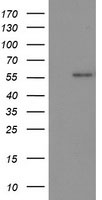p53 (TP53) Mouse Monoclonal Antibody [Clone ID: OTI1E1]
CAT#: CF503033
Carrier-free (BSA/glycerol-free) TP53 mouse monoclonal antibody, clone OTI1E1 (formerly 1E1)
Formulation: Standard
Other products for "TP53"
Specifications
| Product Data | |
| Clone Name | OTI1E1 |
| Applications | IHC, WB |
| Recommended Dilution | WB 1:500~2000, IHC 1:150 |
| Reactivities | Human, Monkey |
| Host | Mouse |
| Isotype | IgG1 |
| Clonality | Monoclonal |
| Immunogen | Full length human recombinant protein of human TP53 (NP_000537) produced in HEK293T cell. |
| Formulation | Lyophilized powder (original buffer 1X PBS, pH 7.3, 8% trehalose) |
| Reconstitution Method | For reconstitution, we recommend adding 100uL distilled water to a final antibody concentration of about 1 mg/mL. To use this carrier-free antibody for conjugation experiment, we strongly recommend performing another round of desalting process. (OriGene recommends Zeba Spin Desalting Columns, 7KMWCO from Thermo Scientific) |
| Purification | Purified from mouse ascites fluids or tissue culture supernatant by affinity chromatography (protein A/G) |
| Conjugation | Unconjugated |
| Storage | Store at -20°C as received. |
| Stability | Stable for 12 months from date of receipt. |
| Predicted Protein Size | 43.5 kDa |
| Gene Name | Homo sapiens tumor protein p53 (TP53), transcript variant 1, mRNA. |
| Database Link | |
| Background | The protein encoded by this gene is a member of the STAT family of transcription factors. In response to cytokines and growth factors, STAT family members are phosphorylated by the receptor associated kinases, and then form homo- or heterodimers that translocate to the cell nucleus where they act as transcription activators. This protein is activated by, and mediates the responses of many cell ligands, such as IL2, IL3, IL7 GM-CSF, erythropoietin, thrombopoietin, and different growth hormones. Activation of this protein in myeloma and lymphoma associated with a TEL/JAK2 gene fusion is independent of cell stimulus and has been shown to be essential for the tumorigenesis. The mouse counterpart of this gene is found to induce the expression of BCL2L1/BCL-X(L), which suggests the antiapoptotic function of this gene in cells. [provided by RefSeq] |
| Synonyms | BCC7; LFS1; P53; TRP53 |
| Reference Data | |
| Protein Families | Druggable Genome, Stem cell - Pluripotency, Transcription Factors |
| Protein Pathways | Amyotrophic lateral sclerosis (ALS), Apoptosis, Basal cell carcinoma, Bladder cancer, Cell cycle, Chronic myeloid leukemia, Colorectal cancer, Endometrial cancer, Glioma, Huntington's disease, MAPK signaling pathway, Melanoma, Neurotrophin signaling pathway, Non-small cell lung cancer, p53 signaling pathway, Pancreatic cancer, Pathways in cancer, Prostate cancer, Small cell lung cancer, Thyroid cancer, Wnt signaling pathway |
Documents
| Product Manuals |
| FAQs |
Resources
| Antibody Resources |
{0} Product Review(s)
0 Product Review(s)
Submit review
Be the first one to submit a review
Product Citations
*Delivery time may vary from web posted schedule. Occasional delays may occur due to unforeseen
complexities in the preparation of your product. International customers may expect an additional 1-2 weeks
in shipping.






























































































































































































































































 Germany
Germany
 Japan
Japan
 United Kingdom
United Kingdom
 China
China







